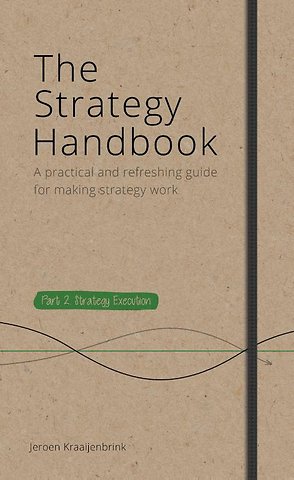The Strategy Handbook Part 2. Strategy Execution
A practical and refreshing guide for making strategy work
Gebonden Engels 2017 1e druk 9789082344332Samenvatting
In dit tweede deel van The Strategy Handbook presenteert Jeroen Kraaijenbrink een verfrissende en praktische aanpak van strategie-implementatie die het strategieproces uit Deel 1 compleet maakt. Gebaseerd op zowel onderzoek als praktijkervaring, biedt het boek een gestructureerde aanpak om strategie te laten werken.
In een plezierige en to-the-point stijl leidt het boek je in vier stappen door een complete aanpak van strategie-implementatie en laat het zien hoe je deze aanpak aanpast aan de specifieke behoeften van een organisatie. Net als Deel 1 bevat het boek een rijke schat aan advies, tools en checklists die direct kunnen worden toegepast in de dagelijks praktijk van elke organisatie die haar strategie wil implementeren. Het boek is complementair aan Deel 1 maar kan ook goed afzonderlijk gebruikt worden.
Het boek is opnieuw eenvoudig te begrijpen en toe te passen. Door de wetenschappelijke basis gaat het echter ook voldoende diep in op de complexiteit en moeilijkheid van strategie-implementatie in de praktijk. Door deze effectieve combinatie van eenvoud en diepgang is Deel 2 van The Strategy Handbook een must-read voor zowel beginners als meer ervaren leiders, managers en ondernemers.
Trefwoorden
strategie-implementatie strategisch management strategie-uitvoering strategie verandermanagement pragmatisme strategische planning gap-analyse organisatieverandering participatief management strategisch leiderschap strategie-executie agile strategie projectmanagement strategierealisatie organisatie praktijkgericht change management organisatiestructuur strategie-implementatiemodel organizational map strategy backlog innovatie strategische besluitvorming organisatieontwikkeling emergente strategie strategische communicatie strategisch denken teamwork strategische controle
Trefwoorden
Specificaties
Lezersrecensies
Inhoudsopgave
U kunt van deze inhoudsopgave een PDF downloaden
-The strategy execution challenge 7
-What kind of book can support strategy execution? 9
-Origins and methodological basis 11
-Five ways to use this book 17
2. Getting ready 19
-A brief recap of strategy generation 19
-Defining strategy execution 21
-The strategy execution process 23
-Choosing a strategy path 29
-The right mindset: ten mottos 32
-Strategy as a participative process 37
-Reintroducing the four examples 42
3. Step 1: Bridging gaps 45
-The bridging challenge 45
-Bridging information gaps 50
-Bridging implementation gaps 60
-Bridging delivery gaps 66
-Closing the bridging step 69
-The four examples 70
Stepping back for a moment 76
4. Step 2: Organizing strategy 77
-The organizational challenge 77
-The Organizational Map 78
-A quick organizational fitness scan 83
-How to use the tools: 1. Leadership, 2. Controls, 3. Motivation, 4. Commitment, 5. Expertise, 6. Information technology, 7. Structure, 8. Communication, 9. Processes, 10. Policies 84
-Connecting bridging and organizing 116
-The four examples 118
Stepping back again 125
5. Step 3: Planning strategy 127
-The planning challenge 127
-Completing the Strategy Backlog 129
-Assembling the realization team 132
-Prioritizing and scheduling 135
-Meetings and briefings 140
-Committing to the plan 142
-The four examples 144
6. Step 4: Realizing strategy 147
-The realization challenge 147
-Managing relevance 148
-Managing progress 153
-Managing emotions 157
-The four examples 167
7. Shaping the strategy process 171
-The complete strategy process 171
-Trade-offs in strategy making: 1. Disruptiveness: repair versus rebuild, 2. Size: all-in versus start small, 3. Visibility: public versus stealth, 4. Agility: linear versus cyclical, 5. Quality: scope versus costs versus schedule, 6. Decision-making: rational versus intuitive, 7. Involvement: inclusiveness versus efficiency, 8. Communication: timeliness versus concreteness, 9. Center of gravity: central versus decentral, 10. Process implementation: episodic versus continuous 174
-What it asks from leaders 193
Afterword 196
Vaak samen gekocht
Anderen die dit boek kochten, kochten ook
Rubrieken
- advisering
- algemeen management
- coaching en trainen
- communicatie en media
- economie
- financieel management
- inkoop en logistiek
- internet en social media
- it-management / ict
- juridisch
- leiderschap
- marketing
- mens en maatschappij
- non-profit
- ondernemen
- organisatiekunde
- personal finance
- personeelsmanagement
- persoonlijke effectiviteit
- projectmanagement
- psychologie
- reclame en verkoop
- strategisch management
- verandermanagement
- werk en loopbaan











